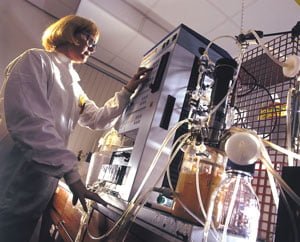
This case study focuses upon the findings of the Department of Trade and Industry which illustrate how the development of a knowledge-driven economy is providing the basis for the UK to close the performance gap on its competitors.
The speed with which electronic communications, information and knowledge cross the world in today’s global market place could not have been envisaged by managers 20 or 30 years ago. It is simply not possible for managers to rely on business strategies used by their predecessors owing to an increasingly complex environment. Today, there is a need for people within organisations to move forward and constantly learn and question their understanding. The development and use of knowledge allows them to adjust to these processes of rapid change.
The Industrial Revolution was built on capital investment in plant and machinery, the use of manual skills and hard labour. Today’s information and knowledge-driven revolution is based on a different foundation in which knowledge has become the predominant element in the creation of wealth.
The growing importance of knowledge is clearly evident. It is perhaps most obvious in the personal computers, mobile phones and sophisticated electronics and communications industry. It can be claimed that two-thirds of the value of a modern motor car is the knowledge that went into designing, engineering and building it, as only one third pays for the raw materials. It is this knowledge that enables a team of people in another part of the world in countries like South Korea, to compete so successfully with many of the huge household names we know so well in this country.

- Codified knowledge can be written down and transferred easily to others, rather like the information contained in this case study
- Tacit knowledge is slower to acquire and much more difficult to transfer. Examples include the knowledge built up during an apprenticeship, understanding how a market works, or familiarity with a particular technology or language. When managers within an organisation are encouraged to use their tacit knowledge to manage change they are developing new competencies as they address different situations. In a knowledge driven world this helps to improve the competitive advantage of their business.
In a global economy, capital is mobile, technology spreads quickly and goods can be made in low cost countries and then shipped to developed markets. It is important, therefore, for people within business organisations to develop capabilities that are hard to imitate.
Within the UK, the distinctive capabilities of business organisations must, therefore, not be raw materials, land or cheap labour but instead be the intellect and creativity of people.
The four key reasons why knowledge is becoming more important are as follows:
1. Information and Communications Technology (ICT)
Today information spins around the world quicker than ever before with entirely new products and services such as digital TV, laptop computers and global positioning systems. Production methods have also been transformed. Electronic commerce and the information highway have made it easier for organisations to do business with each other, transforming the ways in which customers, suppliers and competitors interact.
2. Science and technology
There has been a faster rate of growth in scientific and technical knowledge in recent years. Older technologies have been replaced by integrated approaches such as Computer Aided Design and Manufacture (CADCAM) with the electronic transfer of information. Fundamental advances have additionally taken place in areas such as genetics and biology where new generations of products have been created.
Although such developments have expanded the stock of knowledge and increased the pace of innovation, it has also led to imitation. In these situations tacit knowledge is particularly important as organisations monitor their external environment and respond to the challenges created by scientific and technological change.
3. Global competition
Lower communication and international transport costs, the opening up of new markets and expanding market size have increased the number of global competitors. This has enabled businesses across the world to take advantage of economies of scale to improve their competitive advantage. The pace of globalisation in the world economy has increased considerably since the 1980s. The effect of greater competition and the faster pace of innovation has been to advance the movement towards the concept of the knowledge-driven economy.
4. Changing demand
People today have rising incomes and changing tastes. As people purchase more sophisticated goods and services and value their leisure time more highly, a smaller proportion of their income is spent upon essential goods. People also place more emphasis upon the values of the organisations from which they buy, reflecting their approach to the environment as well as the quality of their goods and services.

Improving economic performance
The UK has to make the most of the opportunities offered by a knowledge-driven economy as they occur, despite its strong position in many areas such as media, advertising, entertainment, financial services and pharmaceuticals. Improving performance requires developing a variety of attributes.
Capabilities – In a knowledge driven economy, the economy is only as strong as its capabilities in skills such as science base, technology, enterprise, innovation and effective capital markets.
Selling ice-cream on the worldwide web
Arden Supplies and its sister company, Excelquip – which together offer all the equipment and ingredients necessary to create an entire ice-cream parlour – are now selling products as far afield as New Zealand, India and Tanzania as a result of going online with a new website.
What was previously a highly seasonal business, owned and operated by the father and son partnership Phil and Brian Tomkins, has been transformed into a 24 hour a day, 365 days a year global business.
Collaboration – Successful business organisations need to collaborate both within the firms and the ways in which they organise themselves, as well as between firms in the way they interact. This includes developing strong team work with suppliers, customers, joint-venture partners as well as between managers and employees.
The Society of Motor Manufacturers and Traders (SMMT) Industry Forum
The SMMT Industry Forum is an industry-led partnership involving many of the best-known names in the automotive industry. Led by expert engineers from major vehicle manufacturers, it aims to raise the sector’s competitiveness by delivering improvements based upon world-class best practice.
Seats for commercial vehicles are manufactured by Isringhausen GB in Wrexham. A team from the Industry Forum helped it to identify a number of wasteful activities which enabled it to increase output by 20% and productivity by 45%.
Competition – It is argued that this is the sharpest spur to improve productivity – that is the production or increase in company/product value and wealth by fully applying the competencies of the work force. Competitive pressures from more open markets and the growth in foreign direct investment drive innovation and increase consumer choice.
Intangibles
A key feature of the knowledge-driven economy is the increasing importance of intangible assets such as brands, research and development, contacts and know-how, as well as the value of specialists. The problem is that these assets are difficult to value.
The intellect and creativity of people are at the heart of the knowledge-driven revolution with a growth of service sector knowledge intensive businesses. Within all sectors workers have to be more highly educated and more must be able to work with customers as part of their daily work as well as participate in teamwork.
People today are also required to work flexibly across a range of job roles as organisations become flatter with fewer layers of management. As the pace of change quickens individuals will have more independence to manage themselves and their own activities with a growth of opportunities.
Clusters and networks
If organisations locate within a cluster of other firms they are able to share expertise and knowledge. Social interaction and informal links have helped many organisations to be successful in areas such as Silicon Valley and the City of London.
The benefit of such interaction and links is located within the accessing of tacit knowledge which, without these links or interaction, would remain with those who have it. Some organisations may wish to set up networks to draw in the expertise within other organisations through inter-firm co-operation in supply chains, sharing financial risks, mentoring or benchmarking best practice. All of this helps organisations to learn from each other and contribute to improving standards and the way business is undertaken.

- facilitate collaboration in areas such as maintenance, waste treatment, education and training programmes and community development
- monitor manpower requirements and technical capability
- act as a focus for new investment
- identify weaknesses in local infrastructure.
Ciba Specialty Chemicals, Water Treatment Limited
Following a successful collaboration in a LINK project with the University of Huddersfield, Ciba Specialty Chemicals continued its relationship by jointly participating in a Teaching Company Scheme (TCS) Programme. The business employs around 1,700 people in Bradford but recognised the need to gain access to the knowledge and skills of the University if it was to design and construct a prototype production plant. The aim was to produce a pilot scale ammonium acrylate from acrylonitrile or acrylamide, allowing full evaluation of the process and providing data for the design of full-scale production.
Dr Ken Symes, Ciba’s senior representative in the TCS Programme, said, ‘By working with the University we were able to complete a techno-economic feasibility study for full-scale production. The new bioprocess has the potential to result in a cleaner technology for the manufacture of a new intermediate; the quality of the new intermediate is also said to be higher and could be used in a wider range of products. It could also help to improve the competitiveness of the business.’
The knowledge-driven society will create higher expectations amongst consumers, who will be more discerning and expect higher standards of products and services. Consumers will be more likely to buy products and services where traders give clear, accurate and understandable information.
Companies who use knowledge in order to provide consumers with what they want in terms of information and back up services (such as redress if things go wrong), as well as the right quality and choice of goods and services, will develop competitive advantages over their rivals that will enable them to be more successful.
Success in the knowledge-driven economy will depend upon how well organisations and individuals exploit their knowledge, skills and creativity. This revolution is about developing high value goods and services through advanced business practices to better meet the needs of consumers.
